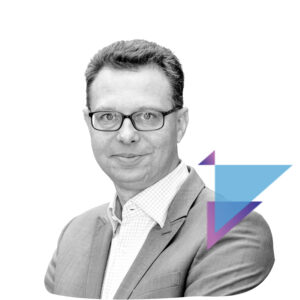Interview – Erik Takes

From time to time, we will interview an ACS employee. This way we trust to give you a better picture of our people. We ask them both work-related and personal questions. Our Manager National Branches, Erik Takes, had the honour to kick off.
Age: 45
Job title: Manager National Branches
Number of years working for ACS: > 10 years

1. What relevant (work) experience did you bring to ACS?
My background is quite diverse; after completing my secondary school, I successfully finished the Commercial Economics course at the HES Amsterdam. Parallel to this, I had the opportunity to follow training courses in England to be trained as a lighting designer. After the training I started working at the ABN AMRO Bank in commerce. In combination with that, I used days off to contribute to international audiovisual projects, with focus on lighting. After a few years I made the switch to ACS to turn my greatest hobby into my full-time job.
2. Which three qualities make you a good manager?
I find it difficult and uncomfortable to comment on that… perhaps you should ask my colleagues. I know one thing for sure: you have to do this work with heart and soul and force yourself to be aware of all available techniques. We are granted assignments for very diverse clients with strongly varying wishes and requirements. In my opinion, it is essential that you can describe functional setups in a clear way, as well as being technically capable of having a conversation on indepth level.

3. What is the main reason that you came to work for ACS?
Working at a full-scale service audiovisual company of a substantial size (84 FTE) which offers appealing customers suits me perfectly. There are no limits to the solutions that we can creatively conceive, design, develop and implement. The seamless connection with customer’s demand and the flawless realisation of productions, regardless of size and changing locations, is and remains a wonderful challenge.
4. What does an average working day look like for you?
I start the day by waking our children and I usually bring my son to school, while my wife looks after our two daughters. From there, directly to the office.
I spend the first hour of the day dealing with current developments, requests and questions from colleagues. From the moment that the day is operational and any ad hoc requests are dealt with, there is time for other work. Then I start with making and reviewing quotes, necessary consultation at an individual and group level, agreements with existing and potential customers. Depending on the period in the year, cyclical tasks are also added such as determining investments, identifying new technical developments, performance and assessment interviews, updating sales plans, etc. The end of the regular working day is all about processing of during the day received non-urgent e-mail.
Two times a week, on average, I stay in the office in the evening to make time for zooming in on complex productions, working out reports and watching developments via LinkedIn. Then I return home to make sure that a new day brings with it a number of new puzzles that I would like to work on!
5. What would you (still) like to achieve with you department?
What I would like to achieve is that the range of possible solutions for productions is not only known, but is also presented to our customers in an understandable way. Within ACS, we increasingly use visualizations based on the ideas discussed with the customer to support the quotation.

6. What is the most challenging project that you have faced at ACS so far? And how did you approach this?
There are countless examples. I will describe two short ones that stand out for me for a variety of reasons:
Example 1
At the end of the second day, during a three-day conference, the customer requested us to turn the room 180 degrees. Normally with a set-up consisting of a large stage, full background in design and a large directing set-up, this is not something we can fix right away.
When we asked the customer about the reason for this change and inquired them about the feasibility in practical and financial terms, they were adament it needed to be done regardless the consequences . Since they had no satisfying answer on the origin of this remarkable request, I carefully inquired about the circumstances just afterwards in a smaller setting. Slightly timidly, our contact person from the organisation office said that the CEO would have an important role to play during the third conference day and that he had to go to the toilet frequently for medical reasons. The (nearest) toilets were in the back of the room. Not only was the distance larger, but the visitors would also notice the frequency of his restroom breaks. I carefully opted whether the placement of the Rolls Royce under the Dixie toilets backstage would be an acceptable solution? After forty-five minutes, we got definitive approval, and a lot of time, money and ad-hoc personnel energy were saved.
Lesson learned: keep asking questions, sometimes at a different time in a different setting.
Example 2
On Wednesday morning we received a request for quotation, in which all information was provided except for the data for construction, operational period and reduction. In such cases we immediately make a call to retrive the vital missing information. This time the planned build-up turned out to be exactly two days later. The build-up would take a maximum of half a day and it was for an operational period of four days. This would have been daily practice if it wasn’t a uncommon production with a quantity of equipment of more than 100 m3, fourteen technicians for construction and five operational technicians. We quickly scrambled and formed a team of colleagues consisting of experts in their respective field, and sent the quotation three hours later. Less than two hours later we received the confirmation. Thanks to flawless cooperation between our different offices it was possible to assign staff on short notice to perform as an operational team. Product specialists in the field of sound, lighting, projection, translation immediately planned the necessary equipment, made technical drawings and finally the construction started 36 hours later.
At that moment you realise that the available equipment, knowledge, experience and mentality makes something possible that many would have thought impossible.
Interesting detail: the customer was a renowed manufacturer of professional audiovisual equipment, that entrusted ACS with the complete presentation of their new product line in such a short period of time!

7. What is your best memory of ACS so far?
The best memory and daily practice is one that says something about our team mentality; the team is so close that even after completing their own work for the day, there is communication between colleagues regarding operations at other locations. As soon as help, support or additional equipment is needed in any way, everyone is ready day and night without exception. That drive, collegiality and loyalty is unique and fills me with great pride.
8. Why would you recommend working at ACS?
If you want to work in an organisation with short lines of communication, like to delve into technical solutions, get energy from conversations with customers, are enthusiastic and realize that the products are packed in flight cases, however all the necessary knowledge and expertise is packed in the minds of colleagues, then you may just consider to contact me.
9. What makes you very happy outside working hours?
Meeting friends, sailing, dining out, beach, sun and my family!
10. What else do people really need to know about you?
I would have liked to become a commercial pilot and I think that, to compensate for the fact that I will never be allowed to fly a commercial plane, I decided to know as much as possible about it. By the way, a commercial aircraft is also the ultimate customised product, whereby several factors determine the final implementation and equipment! You cannot order a plane from a catalog and that, in my opinion, also applies to audiovisual techniques and setups!

